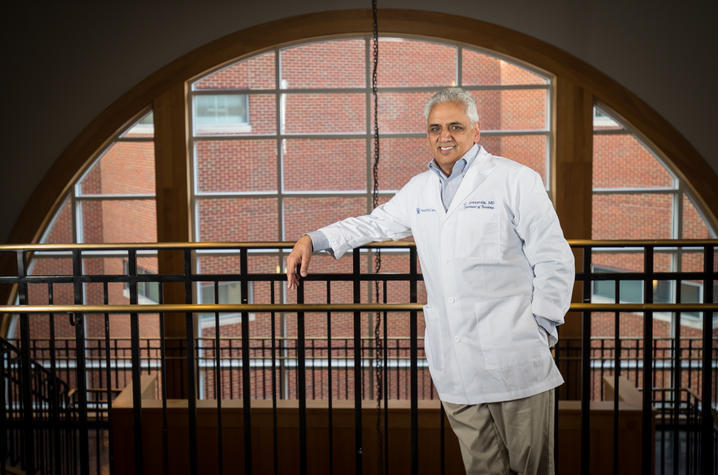Work by UK neurologist to improve access to multiple sclerosis treatments accepted by WHO

LEXINGTON, Ky. (Aug. 9, 2023) — For the first time, the World Health Organization (WHO) has added three disease-modifying therapies for multiple sclerosis (MS) to its Essential Medicines List (EML).
Jagannadha “Jay” Avasarala, M.D., Ph.D., director of the Comprehensive Care Center for Multiple Sclerosis and Neuroimmunology at the Kentucky Neuroscience Institute, says this is a landmark achievement for UK and the field as a whole.
Avasarala represented the American Academy of Neurology as its Chair (2020-22) and participated in the 18-month long program, organized by MSIF (MS International Federation) along with researchers from across the globe to put together a list of drugs for MS that was later submitted to the WHO for approval. The drugs were selected for safety, efficacy, availability in the local communities and expense.
The collaborative, international effort was published in the The Lancet Neurology back in the Spring of 2023. Avasarala states that “access to treatments for neurological disorders is egregiously insufficient, particularly in low-income and middle-income countries.”
The WHO chose to accept the group’s submission and have now added three drugs to their EML. The three treatments added are rituximab, cladribine and glatiramer acetate.
Avasarala and others say it is important to note that the three medicines listed provide a baseline of care but are not the only ones that are effective and important for the treatment of MS. As this is the first time that MS treatments are included, a new section has been created on the list to emphasize the importance of treatments for MS.
The WHO’s EML is an internationally recognized set of selected medicines to help countries choose how to treat their priority health needs. Countries frequently use the list to develop their own national lists of essential medicines.
“The inclusion of therapeutic agents on the WHO Model List of Essential Medicines (EML) is an initial step to potentially increase their availability worldwide, as the list serves as a guide for the development of national and institutional EMLs,” said Avasarala.
MS happens when a person's immune system attacks the nerve cells and renders them unable to properly transmit information, causing balance issues, weakened vision, fatigue, and other unpredictable symptoms. Approximately 2.5 million people worldwide suffer from multiple sclerosis. The cause is unknown, and there is no definitive cure.
The MSIF, a global network of MS organizations, along with people affected by MS, volunteers and staff from around the world, previously applied in 2018 for three disease-modifying treatment (DMTs) to be added to the WHO EML. That attempt was unsuccessful as the WHO said that no clear evidence was provided that the DMTs listed were superior to other drugs in safety, efficacy and affordability and that the application had excluded commonly used drugs and off-label medications.
Based on that feedback, as Avasarala explained, the group put together by MSIF went back to the drawing board and in collaboration with the Cochrane MS group and using the McMaster GRADE system, systematically assessed all on-label and off-label DMTs for MS.
They are elated that their perseverance on this work has paid off. The team of MS experts believes that including these drugs will facilitate the procurement, availability, and affordability of these medicines and ultimately improve the health outcomes and quality of life of people with MS around the world.
UK HealthCare is the hospitals and clinics of the University of Kentucky. But it is so much more. It is more than 10,000 dedicated health care professionals committed to providing advanced subspecialty care for the most critically injured and ill patients from the Commonwealth and beyond. It also is the home of the state’s only National Cancer Institute (NCI)-designated Comprehensive Cancer Center, a Level IV Neonatal Intensive Care Unit that cares for the tiniest and sickest newborns and the region’s only Level 1 trauma center.
As an academic research institution, we are continuously pursuing the next generation of cures, treatments, protocols and policies. Our discoveries have the potential to change what’s medically possible within our lifetimes. Our educators and thought leaders are transforming the health care landscape as our six health professions colleges teach the next generation of doctors, nurses, pharmacists and other health care professionals, spreading the highest standards of care. UK HealthCare is the power of advanced medicine committed to creating a healthier Kentucky, now and for generations to come.




